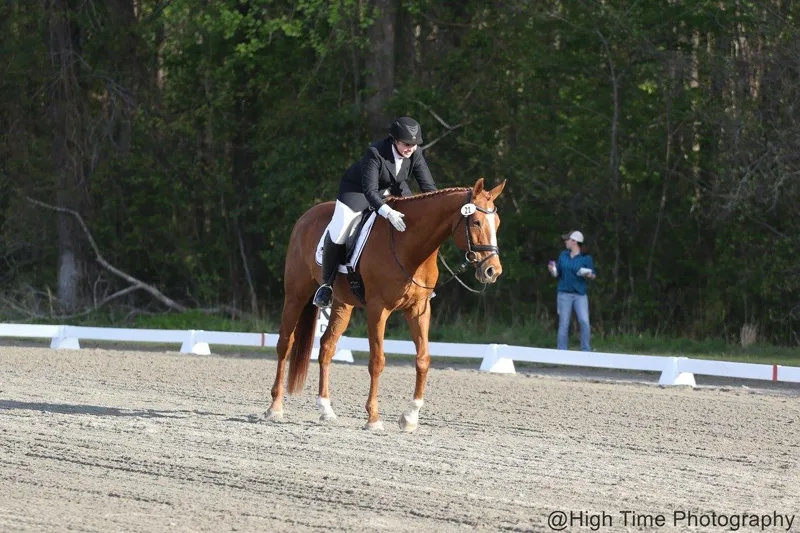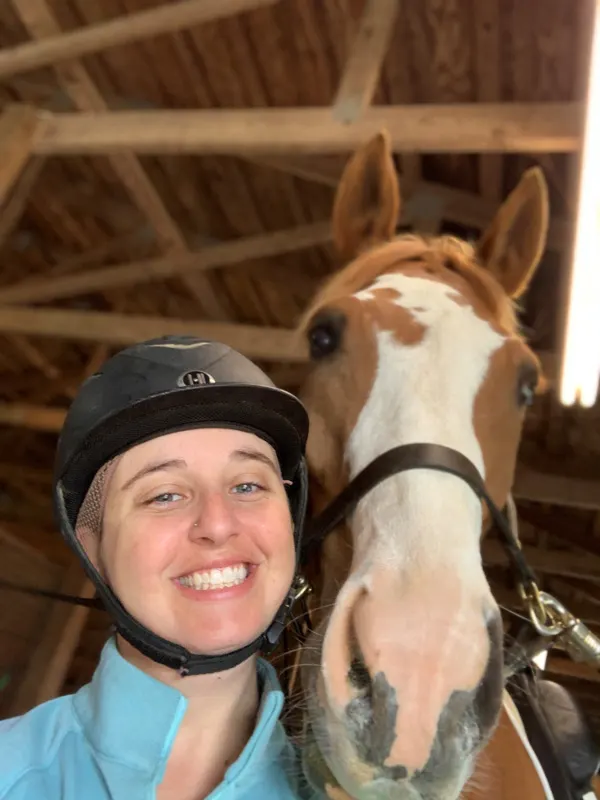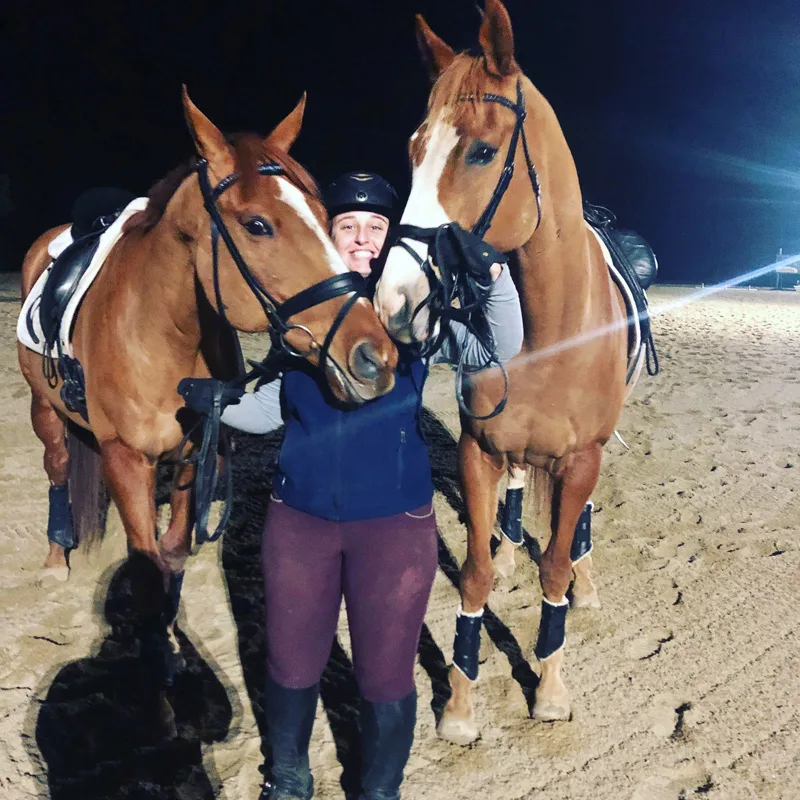I was a typical horse-crazy kid in suburbia who begged constantly for riding lessons. I began riding at a hunter/jumper barn when I was 9. When I was 12, my parents noticed a drastic change in my behavior.
I had a diary, and it starts off like, “I can’t wait to get my own horse,” and it ends with, “I hate my parents. I want to die.” It’s so extreme. I went from this happy-go-lucky kid to this monster, this alien inhabiting my body. I don’t know where this came from. All I remember from that time is feeling incredibly angry. Being told that I needed to see someone just made me angrier.
I was diagnosed with bipolar disorder and put on a mood stabilizer as well as an antidepressant. I just was like, “OK, fine, I guess I have to do this,” and then I continued my self-destructive ways like drinking really young, doing some drugs, sneaking out—really getting into some serious trouble.
The lowest point was a suicide attempt when I was 13, after I got the news that I was getting thrown out of school. I was an honor roll student. I’d gotten into an accelerated middle school that takes like 10 kids from each school, and then I ended up getting into a lot of trouble in eighth grade. I got put on homebound, which means you’re not expelled, but you can’t come back to school—so you finish out the school year with tutors.

“Teaching an animal something is reflective of you, and I think you can learn a lot about yourself by how you’re able to teach them,” says Samatha Silver. High Time Photography Photo
I easily did the rest of the schoolwork with no problem, and my mom was like, “You don’t get to sit on the couch and get rewarded for this. You’re going to get a job.” I got a work permit, and I worked at an Arabian horse farm from March until August. I was already horse crazy, and they said I had to get a job—and how many things can a 13-year-old do? I bought one of their horses at the end of the summer, a totally unsuitable ex-racing Arabian mare. She bucked me off countless times.
I quit riding from about 15 to 18 because I started doing martial arts, and I also had a horse that scared me. The martial arts took up all my time and straightened me out, No. 1 because I had to stop smoking cigarettes because I couldn’t breathe. It just slowly put me on the straight and narrow because I wanted to do that more than I wanted to go out and do stupid things. I have a feeling that if I’d had a safe horse, then I would have been riding instead of doing those stupid things.
I had made this goal to get my black belt in Tae Kwon Do, and I achieved it. But it wasn’t the grand passion of my life—riding is my grand passion. I kind of was like, “Well, I really want to start riding again. I don’t have the time to do both.”
I moved out of my parents’ house when I was 18, and I stopped taking my medication because I thought I was fine. That’s the other thing: You’re fine when you’re on medication because you’re on medication. It’s not something you can stop and continue to be fine. As a young adult I was like, “Well this just seems stupid and like a waste of time, so I don’t really need this.”
I had a nervous breakdown when I was about 22. Depression is insidious. You don’t go from fine to terribly, terribly suicidally depressed in a matter of a day. It takes a while. [When I had my nervous breakdown] I was like, “OK, I don’t know how to function on my own. I don’t feel capable of taking care of myself. I’m a little afraid of myself right now.” My instincts were to go home, so I moved back in with my parents for a couple weeks to try to get a grip on things. There was all the crying. All the not getting out of bed. I basically went to work, came home and went to bed.
ADVERTISEMENT
I had a horse at the time—I wish I had him now—I made him very anxious, and I feel responsible because he ended up with ulcers and all this stuff. My emotions were all over the place. I didn’t feel successful in my riding career. It’s always been a huge thing [for me] that I feel like I’m accomplishing something and getting somewhere with my riding and with the horses, [and at that time] I didn’t feel good that way. I was realizing that a desk job was probably what the rest of my life looked like, and that was kind of disheartening. It certainly wasn’t any one thing; if I’d been on medication the breakdown probably wouldn’t have happened because I would have had a doctor checking in on me regularly.

“There’s a lot of anger involved: ‘Why should I have to deal with this?’ or ‘Why should I have to deal with this every day of my life? I take all kinds of medication just to get through my day. Why do I have to do this?’ ” says Samantha Silver. Photo Courtesy Of Samantha Silver
I read somewhere that bipolar people have big emotions; that really struck a chord with me because that’s exactly what it is. Everyone feels sad, but bipolar people feel the weight of the world is on their shoulders, and they can’t get up. It’s not a normal level of sadness.
When people are depressed, they alienate themselves, and they also think they’re not worthy of being helped. “I’m not worthy of being this person’s friend. I am nothing. I’m not good enough for this.” Anxiety can do this too; the voice in your head turns into your worst enemy. You become very mean to yourself, quite honestly. You say horrible things to yourself that you would never say to another person. The voice inside your head, your inner thoughts, they go in a terrible direction, and that just makes it even harder [to seek help and get better]. Even now, I’ve been dealing with this for 20 years, it’s still hard when I am super depressed to face the reality that there is an end to this; this will get better. There is a light at the end of this tunnel. All those statements are so cliché, but they’re true. When someone’s going through this for the first time, it’s horrible.
I don’t get super manic. I have very short episodes of mania—it’s like I’m just super wound up. I can see myself talking really fast and almost stuttering over my words because I’m talking so fast and spending money. It’s almost like I’m watching, and I can’t do anything to stop it—which is how I know that it’s not just normal excitement.
There’s a lot of anger involved: “Why should I have to deal with this?” or “Why should I have to deal with this every day of my life? I take all kinds of medication just to get through my day. Why do I have to do this?” There can be so much anger and rage and frustration.
It’s really hard when you’re feeling bad to reach out for help. [When I had my nervous breakdown] I was so desperate to feel better. I felt so terrible. I was so unhappy and so miserable. What do I have to do to make myself feel better? I felt like I was at my wits’ end with my life, and so I needed to get help in literally every way possible.
I started seeing a psychiatrist again and got on medication. I found an incredible therapist who has helped me develop coping mechanisms. Those include meditation as well as this technique called tapping, where you tap on specific points and on places on your body and your face and your head and your chest. It’s a specific order. You just keep repeating it. You repeat phrases to yourself, positive phrases, and gradually—it’s incredible how it works—the weight on your chest begins to lessen a little bit.
I’m very open about what I suffer from—I’m not ashamed. Now, at 32, I take a mood stabilizer and two antidepressants, as well as sleeping medication and anxiety medication as needed.
I do equine insurance claims [for Liberty Mutual Insurance]. The work is fascinating for me because it keeps me on the edge of what’s going on medically. I’m not one of the first people to know the new procedures, but I’m not far behind the first wave. As soon as it’s open to the public, people start calling about coverage for it, so I get to find out about the newest and latest treatments all over the country and all over the world.
ADVERTISEMENT

“Mental health is incredibly serious. For me it is a matter of life and death a lot of times. I just want people to know that there are ways to get through this. There is help available,” says Samantha Silver. Photo Courtesy Of Samantha Silver
Riding is an enormous part of my life. If riding is not going well, nothing is going well. I work at the barn two days a week, doing stalls and turning out horses—that’s just to work off board. I’m usually out there six days a week. My work is flexible, and that helps. My arena has lights so I can ride in the dark in the winter. I set goals for myself with the riding, and I’m obsessive about achieving them.
It’s really hard for me to not be able to be the type of rider that I want to be—the type who can ride anything—and that is probably my personality as well as having bipolar disorder. I am pretty spooky and wound tight, so I don’t do well long term with sensitive or hot horses. I end up making them crazy.
[But with my horse Echo] from the moment I sat on him, I felt safe. I was like, “This is my home; I’m safe. I can do this.” He gives me confidence because he doesn’t react to me. It’s the same way a horse person who doesn’t give a spooky horse a reaction gives them confidence. I earned my bronze medal in 2018 on this off-the-track Thoroughbred with blown suspensories, a history of rearing, who has absolutely no freedom in his shoulders. He’s a little crotchety, and he thought bending was for other people, not for him.
[These days though] his work level has dropped way back because his arthritis has gotten bad. He’s fully leased out between two lovely amateur women. [My new horse] is Rory, aka Youmightbearedneck, and his owner is my best friend Michelle Craig. Michelle was like, “Rory does not like foxhunting. It’s just not his thing.” She thought he needed to be a show horse; that’s what Rory really enjoys, and I needed a project. It’s great for everybody involved. Rory’s happy. My trainer thinks he could do the FEI levels, which is my goal.
I think training horses has helped me, not that I’m a trainer by any stretch or that I’ve trained a lot. I trained Echo to third level, [my former off-track Thoroughbred] Tiger to first level, and Rory’s at training level right now. Teaching an animal something is reflective of you, and you can learn a lot about yourself by how you’re able to teach them. [I’ve learned you need to be] patient with yourself, allowing yourself time to grow, just like you would with a horse that is learning something new. You’re not going to choose the windy, rainy day to get on him for the first time after a week off. You’re going to set yourself up for success and wait for the next day when it’s going to be sunny and warm. You kind of translate that to yourself. I know that sounds really simple, but think of it as the way you would think of it with a young horse: “How do I set myself up for success?”

“Think of it as the way you would think of it with a young horse: ‘How do I set myself up for success?’ ” says Samantha Silver, pictured here with Echo and Rory. Photo Courtesy Of Samantha Silver
It’s taken me years and years to realize that some days I just shouldn’t get on, or I should just ride bareback. I was like, “I shouldn’t have to be this way because other people aren’t this way.” I really struggled with that. As I’ve gotten older, I’ve realized everyone has those days.
Mental health is incredibly serious. For me it is a matter of life and death a lot of times. I just want people to know that there are ways to get through this. There is help available. There are ways that you can get through this. You can suffer from these horrible illnesses and still lead a normal life. You have to take care of yourself, yes. If you’re prescribed medicine, take your medicine. Do the things that you’re supposed to do to help yourself, and set yourself up for success. Horses are therapeutic to all people, not just horse people—but specifically horse people. Be empathetic [like you would] to your horse. Learn to be kinder to you, just like you would to your horse.
May is Mental Health Awareness Month, and this month the Chronicle is bringing you several blogs and articles on the subject. Visit nami.org/help for free resources regarding mental health. The U.S. Equestrian Federation also offers some free mental health services for members.














